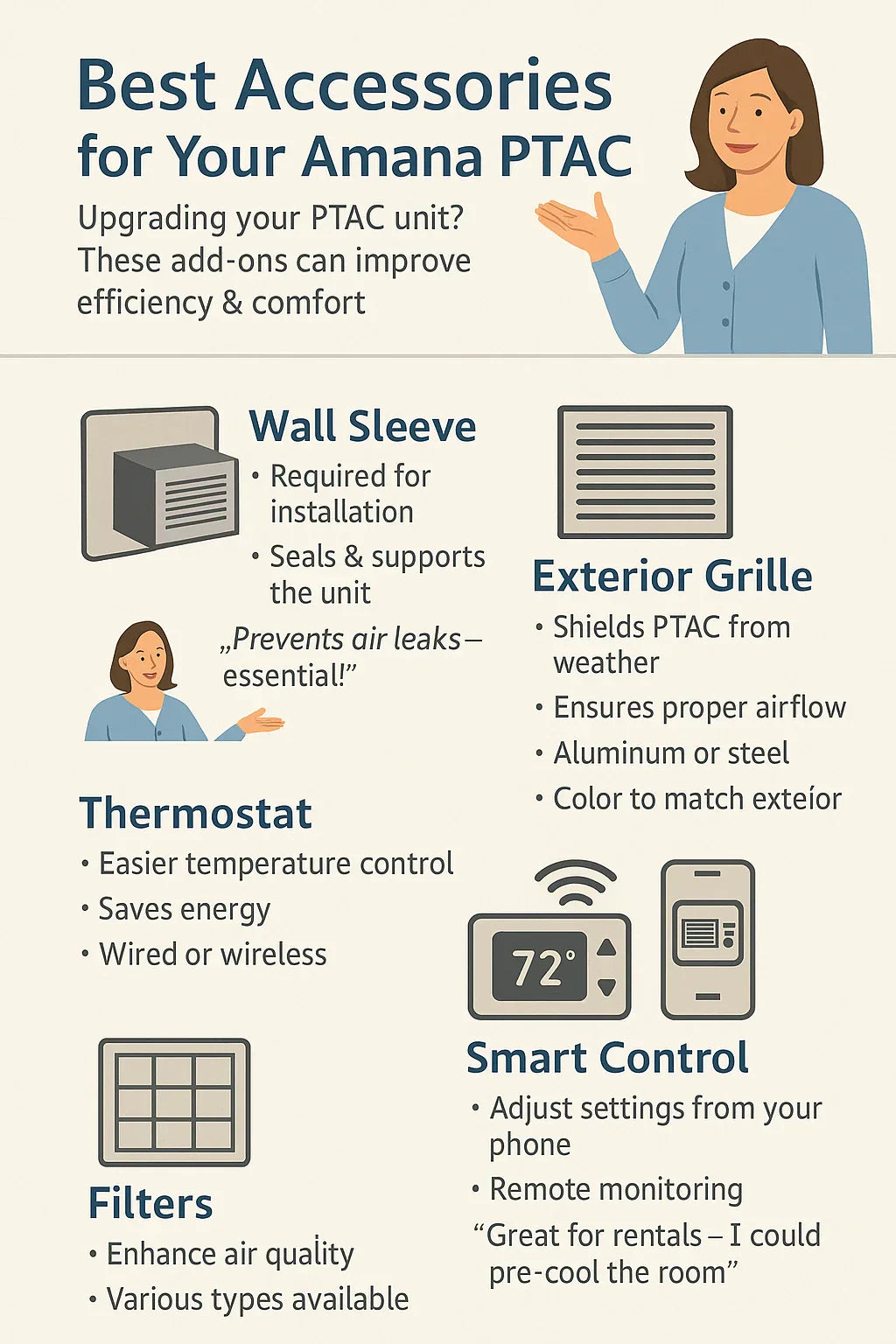When I first installed the Amana Distinctions 9,000 BTU PTAC Heat Pump with 2.5 kW Electric Backup in my cousin’s Airbnb studio, I thought the unit itself was the star of the show. But very quickly, I learned that the right accessories can make or break your installation.
From the wall sleeve that keeps the system sealed, to thermostats that make temperature control easier, to smart Wi-Fi controls that add convenience—accessories are what take your PTAC from good to great.
In this guide, I’ll break down the best PTAC accessories, why you need them, and which ones I recommend for comfort, efficiency, and durability.
🧱 Wall Sleeves: The Foundation of Every PTAC
If there’s one accessory you cannot skip, it’s the wall sleeve.
🔹 What it does:
-
Acts as a protective shell inside the wall.
-
Supports the weight of the PTAC unit.
-
Provides insulation and prevents air leaks.
-
Ensures proper drainage of condensation.
Without it, your PTAC won’t fit properly and you’ll deal with drafts, water intrusion, and efficiency losses.
🔹 What to look for:
-
Compatibility: Amana PTACs typically use a 42-inch wide standard sleeve.
-
Material: Steel for durability, polymer-coated for corrosion resistance.
-
Sealing: Comes with insulation strips to close gaps.
👉 Samantha’s tip: “Don’t try to reuse an old, rusty sleeve. We installed a fresh one, and sealing it properly made the studio feel airtight.”
🔗 Reference: Amana PTAC Wall Sleeve Info
🌀 Exterior Grilles: Protection + Airflow
Once the sleeve is in, you need an exterior grille on the outside wall.
🔹 Why it matters:
-
Protects condenser coils from weather, leaves, and pests.
-
Ensures proper airflow so the unit runs efficiently.
-
Improves curb appeal with a finished look.
🔹 Options:
-
Aluminum grilles: Lightweight, corrosion-resistant.
-
Steel grilles: Heavier, more durable, usually powder-coated.
-
Architectural styles: Some grilles can be painted to match siding.
👉 Samantha’s story: “We almost skipped buying a grille to save money. But once we installed it, I realized how much airflow improved and how much cleaner the outside looked.”
🔗 Guide: Energy.gov – Room AC Installation.
🎛️ Thermostats: Smarter Temperature Control
Yes, your Amana PTAC has built-in controls, but adding a thermostat changes the game.
🔹 Why add a thermostat?
-
Maintains more consistent temperature.
-
Prevents guests from overcooling or overheating a space.
-
Cuts down on energy waste.
🔹 Types:
-
Wired wall thermostats
-
Simple, reliable, and affordable.
-
Often used in hotels for guest rooms.
-
-
Wireless thermostats
-
Easier installation.
-
Flexible placement in rooms without rewiring.
-
-
Programmable thermostats
-
Let you set schedules (day/night, weekday/weekend).
-
Ideal for rentals where energy savings matter.
-
👉 Samantha’s tip: “For the Airbnb, we added a basic programmable thermostat. Guests got simple comfort, and my cousin saved about 15% on energy bills.”
🔗 Learn more: Energy Star – Smart Thermostats.
📱 Smart Controls: Wi-Fi & App Integration
The latest PTAC add-ons include smart Wi-Fi modules and controls.
🔹 Why they matter:
-
Remote control via phone app.
-
Monitor energy use.
-
Adjust temperature before arriving or for guests.
-
Prevent guests from abusing settings (like cranking heat to 90°F).
🔹 Amana DigiSmart System
Amana offers the DigiSmart PTAC Control System, which includes:
-
Wi-Fi compatibility.
-
Central control for multiple units.
-
Energy management software for hotels and rentals.
👉 Samantha’s story: “The smart control was a lifesaver—I could set the PTAC to cool before guests arrived. No more last-minute scrambling.”
🔗 Reference: Amana DigiSmart PTAC Controls.
🔇 Noise & Airflow Accessories
Not every accessory is essential, but these extras can improve comfort and quiet operation.
🔹 Options:
-
Sound absorption kits – reduce humming and rattling.
-
Air deflectors – redirect airflow so it doesn’t blow directly on the bed.
-
High-efficiency filters – improve air quality, especially in rentals.
👉 Samantha’s note: “In a small studio, airflow matters. A simple deflector kept the cool air moving around the space instead of blasting one corner.”
🔗 Indoor air quality info: EPA – Air Cleaners and HVAC Filters.
💰 Cost & Value Breakdown
Here’s what to expect when budgeting for PTAC accessories:
| Accessory | Typical Cost | Value Added |
|---|---|---|
| Wall Sleeve | $120–$180 | Essential – required for install |
| Exterior Grille | $60–$120 | Protects unit + improves airflow |
| Thermostat | $80–$200 | Saves energy + adds comfort |
| Smart Controls | $150–$250 | Remote control + monitoring |
| Noise/Airflow Kits | $40–$100 | Comfort + air quality improvements |
👉 Samantha’s perspective: “We spent about $300 extra on accessories. Within a year, the energy savings and guest comfort easily paid for themselves.”
🛠️ Maintenance Considerations for Accessories
Accessories also require seasonal check-ups:
-
Wall sleeve: Inspect sealant annually, reseal if gaps appear.
-
Grille: Clean debris (leaves, dirt) every spring/fall.
-
Thermostats: Replace batteries (wireless models).
-
Smart controls: Update software/firmware as needed.
-
Filters/air kits: Replace every 1–3 months.
🔗 Reference: ASHRAE HVAC Maintenance Standards.
✅ Key Takeaways
-
Wall sleeve + grille are non-negotiable for PTAC installation.
-
Thermostats add comfort and save energy.
-
Smart controls are perfect for rentals or multi-room management.
-
Noise and airflow accessories improve guest satisfaction.
-
Accessories aren’t just extras—they’re investments in efficiency, comfort, and long-term performance.
In the next topic we will know more about: Maintenance Checklist for Your Amana 9,000 BTU: Filters, Coils & Seasonal Care







